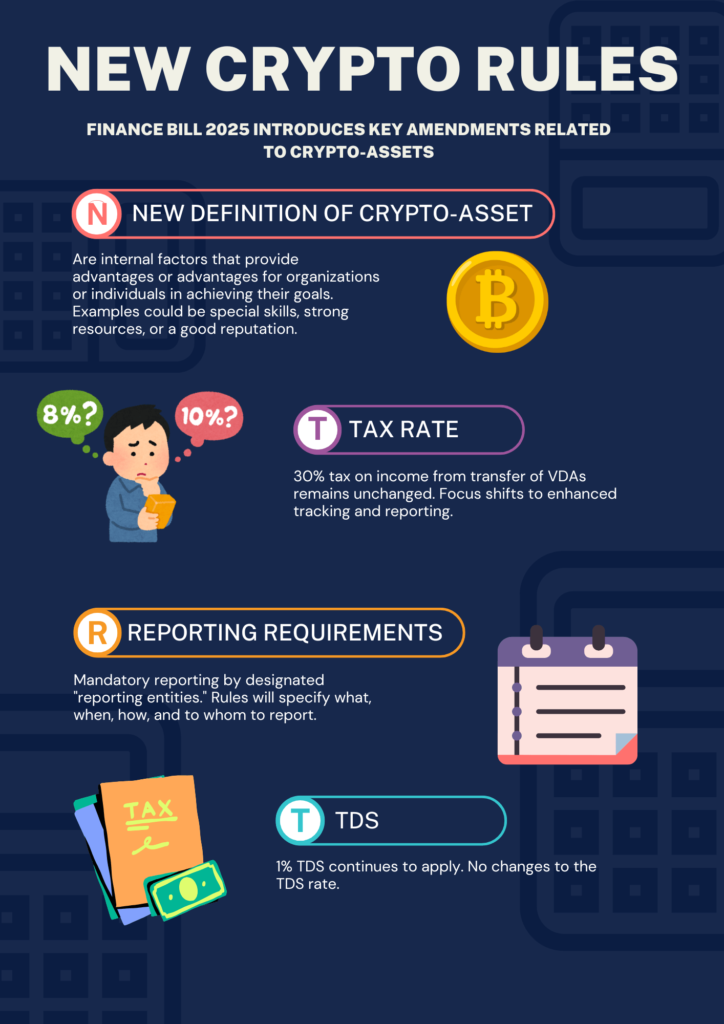Finance Bill 2025 Crypto Tax: India’s New Crypto Tax Rules Explained
India’s Finance Bill 2025 Crypto Tax now officially recognizes and taxes crypto-assets. This is a big step in regulating the fast-growing digital currency market.
On Thursday, Finance Minister Nirmala Sitharaman tabled the new Income Tax Bill 2025 in Lok Sabha. The bill, which includes changes to direct tax laws, will now be sent to a Select Committee for further review. The Lok Sabha proceedings have been adjourned till March 10, and the Speaker has been asked to form a review committee to examine the bill in detail.
In this article, we’ll break down what the new tax law means, how it compares to previous rules, and how it affects investors, traders, and the crypto industry.
The Finance Bill 2025: Key Amendments Related to Crypto-Assets
The Finance Bill 2025 introduces key amendments related to crypto-assets and imposes new obligations for reporting transactions involving such assets. Here’s a simplified breakdown:

Key Amendments:
- Amendment to Section 2 (Definition of Crypto-Asset):
- A new sub-clause (d) is added to clause (47A) of Section 2 of the Income-tax Act.
- Crypto-asset is defined as:
- A digital representation of value.
- Relies on cryptographically secured distributed ledger technology (e.g., blockchain) or similar technology to validate and secure transactions.
- This definition applies even if the asset is already covered under other sub-clauses (a), (b), or (c).
- Effective Date: 1st April 2026.
- Insertion of New Section 285BAA (Reporting Obligations for Crypto-Asset Transactions):
- Reporting Entities (to be prescribed by rules) must:
- Furnish information on crypto-asset transactions.
- Submit this information in a statement to the prescribed income-tax authority.
- The statement must include details like the nature of the transaction, period, time, form, and manner as specified by rules.
- Central Government will prescribe:
- Registration requirements for reporting entities.
- Nature of information to be maintained.
- Due diligence procedures for identifying crypto-asset users or owners.
- Effective Date: 1st April 2026.
- Reporting Entities (to be prescribed by rules) must:
Key Provisions of Section 285BAA:
- Defective Statements:
- If the income-tax authority finds a statement defective, they will notify the reporting entity.
- The entity has 30 days (or more, if allowed) to rectify the defect.
- Failure to rectify will be treated as furnishing inaccurate information.
- Non-Filing of Statements:
- If a reporting entity fails to submit the statement on time, the income-tax authority can issue a notice.
- The entity must then file the statement within the specified time in the notice.
- Correction of Inaccuracies:
- If a reporting entity discovers inaccuracies in a submitted statement, they must:
- Inform the income-tax authority within 10 days.
- Provide the correct information as per prescribed rules.
- If a reporting entity discovers inaccuracies in a submitted statement, they must:
- Central Government Rules:
- The government will specify:
- Who must register as a reporting entity.
- What information must be maintained.
- Due diligence processes for identifying crypto-asset users or owners.
- The government will specify:
Effective Dates:
- Definition of Crypto-Asset (Section 2): 1st April 2025.
- Reporting Obligations (Section 285BAA): 1st April 2026.
Here’s a comparison table summarizing the crypto tax updates from Budget 2023, Budget 2024, and Budget 2025:
| Feature | Budget 2023 (FY 2022-2023) | Budget 2024 (FY 2023-2024) | Budget 2025 (FY 2025-2026) |
|---|---|---|---|
| Definition of Crypto-Assets | Crypto-assets categorized as Virtual Digital Assets (VDAs) under Section 2(47A). | No change in definition. Crypto-assets remain classified as VDAs. | Expanded definition to explicitly include any crypto-asset using cryptography and distributed ledger technology. |
| Tax Rate | 30% tax on income from crypto transactions. | 30% tax on income from crypto transactions remains unchanged. | 30% tax on income from crypto transactions remains unchanged. |
| TDS | 1% TDS on transactions exceeding ₹10,000. | 1% TDS on transactions exceeding ₹10,000 remains unchanged. | 1% TDS on transactions exceeding ₹10,000 remains unchanged. |
| Reporting in ITR | No dedicated section for crypto in ITR. Gains reported under general income heads. | Schedule VDA introduced in ITR for declaring crypto gains. | Dedicated Schedule VDA in ITR for streamlined reporting of crypto gains. |
| Deadline for ITR Filing | Standard ITR filing deadlines applied. | Filing deadline: July 31, 2024. Belated return option until December 31, 2024. | Filing deadline: July 31, 2026 (for FY 2025-2026). Belated return option likely available. |
| Reporting by Entities | No specific reporting requirements for crypto exchanges or entities. | No specific reporting requirements for crypto exchanges or entities. | Mandatory reporting by crypto exchanges and entities. Detailed reports to tax authorities. |
| Focus | Introduction of crypto taxation in India. Crypto classified as VDAs, not currencies. | Improved compliance with the introduction of Schedule VDA in ITR. | Enhanced transparency and compliance through mandatory reporting and expanded definitions. |
| Key Changes | – 30% tax on crypto income. – 1% TDS on transactions > ₹10,000. – Crypto classified as VDAs. | – Introduction of Schedule VDA in ITR. – No changes to tax rates or TDS. | – Expanded definition of VDAs. – Mandatory reporting by entities. – Dedicated Schedule VDA in ITR. |
Key Takeaways:
- Budget 2023:
- Introduced crypto taxation in India.
- Crypto classified as VDAs (not currencies).
- 30% tax on income and 1% TDS on transactions > ₹10,000.
- Budget 2024:
- Introduced Schedule VDA in ITR for declaring crypto gains.
- No changes to tax rates or TDS.
- Focused on improving compliance through better reporting.
- Budget 2025:
- Expanded definition of VDAs to explicitly include crypto-assets.
- Introduced mandatory reporting by crypto exchanges and entities.
- Continued use of Schedule VDA in ITR for streamlined reporting.
- Focused on enhancing transparency and compliance.
How Do These Rules Compare to Previous Laws?
| Feature | Before Finance Bill 2025 | After Finance Bill 2025 |
|---|---|---|
| Definition of VDA | Included virtual currencies, NFTs, and other digital assets. Crypto-assets were implicitly covered but not explicitly defined. | Explicitly includes any crypto-asset using cryptography and distributed ledger technology, regardless of prior coverage. |
| Reporting Requirements | No specific reporting requirements for crypto-asset transactions. General tax rules applied. | Mandatory reporting by designated “reporting entities.” Rules will specify what, when, how, and to whom to report. |
| Tax on Crypto Transactions | 30% tax on income from transfer of VDAs. Capital gains tax applied to profits. | 30% tax on income from transfer of VDAs remains unchanged. Focus shifts to enhanced tracking and reporting. |
| TDS | 1% TDS applied on payments for transfer of VDAs. | 1% TDS continues to apply. No changes to the TDS rate. |
| Focus | General taxation of VDAs, with implicit coverage of crypto-assets. | Explicitly targets crypto-assets with specific reporting obligations to improve tax compliance. |
| Effective Date | Existing tax laws applied. | Expanded VDA definition: Effective from April 1, 2025. Reporting requirements: Effective from April 1, 2026. |
How Will This Impact Crypto Investors and Traders?
- For Investors and Traders
- More paperwork: Investors must keep detailed records of their transactions.
- Higher taxes for short-term traders: Short-term traders may pay more taxes, while long-term investors benefit from indexation.
- For the Crypto Market
- Greater legitimacy: The government’s recognition of crypto may attract more institutional investors.
- Less uncertainty: Clear tax rules create a more stable market.
- For the Government
- More revenue: Crypto taxation creates a new source of government income.
- Better regulation: TDS helps track transactions and prevent tax evasion.
Our Opinion
The Finance Bill 2025 Crypto Tax is a major step toward regulating India’s crypto market. By treating crypto as a capital asset and introducing a structured tax policy, the government aims to bring transparency and accountability to the sector. While investors may face a higher compliance burden, the new rules provide clarity and legitimacy to the market.
As the crypto space continues to evolve, staying informed and following the latest tax rules is essential. Whether you’re an investor, trader, or just exploring crypto, understanding these new tax policies will help you make informed decisions.
Disclaimer: The information in this article is for general informational purposes only and does not constitute financial, legal, or tax advice. While we strive to provide accurate and up-to-date details, tax laws and regulations may change. We recommend visiting the official Government of India websites and consulting with a tax professional to verify the latest rules and compliance requirements before making any financial decisions.






Leave a Reply